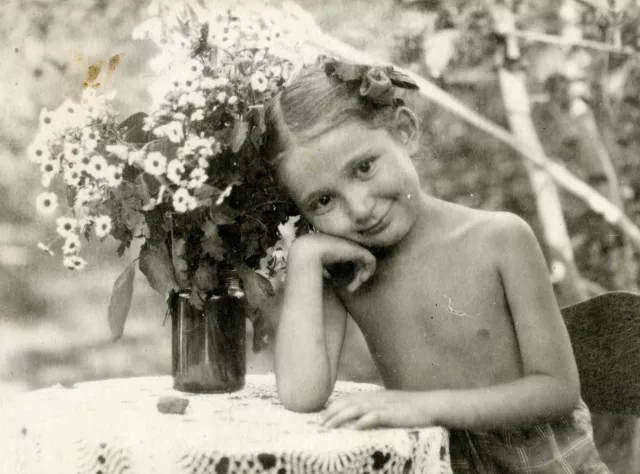This is me before our departure from Alma-Ata to Leningrad from evacuation in 1945. We were at the ?Dom Sovetov? hotel, where ?Lenfilm? actors and clerks lived. I was trying to find a nice posture in order to look beautiful.
My most distinct recollections are connected with the time of our evacuation to Alma-Ata, when I was 4 years old. But I also remember our boarding school during the blockade. I recall my mother, being on duty, walking into our room, approaching each bed, bending over each child. And I was so jealous because she didn't come up to me immediately. I started crying bitterly. Even though she had explained to me that she was a doctor and had to treat me the same way she treated other children because some of them didn't have mothers. I understood it but didn't stop crying.
I also remember crossing the road across the Ladoga Lake on a motor boat and railroad bridges. In Alma-Ata we lived in a pise house with the family of my mother's older brother. [Editor's note: A pise house was a house with walls built out of straw mixed with clay; the floor was also clay.] Later we got a room in the hotel, where the Lenfilm employees lived. I went to a kindergarten in Alma-Ata and learnt a song there. It went: 'A Jew slowly crossed the road' and so on. I was 5 years old and it was the time when mother commenced my Jewish upbringing. At that time and during my school years she kept telling me, 'Don't forget that you are a Jew and won't get away with something your Russian friends will be able to get away with'. My husband-to-be and many other Jews, with whom I spoke about it later, heard almost the same thing from their relatives. I was convinced that if I wanted to achieve something I had to work more and harder. It became my belief. I also said this to my children when the time came.
The most striking thing in Alma-Ata was Victory Day. I heard about it when I was in the hotel entrance hall and on my way to the kindergarten. The kindergarten wasn't far away and I walked there on my own. I ran the whole way in order to tell the children about it, because almost no one had a radio at home. And still, when I recall that moment, I hear the happy screaming and see the cloud of dust, which was the result of our happy tramping and jumping around.
Galina Shkolnikova
The Centropa Collection at USHMM
The Centropa archive has been acquired by the United States Holocaust Memorial Museum in Washington, DC.
USHMM will soon offer a Special Collections page for Centropa.
Academics please note: USHMM can provide you with original language word-for-word transcripts and high resolution photographs. All publications should be credited: "From the Centropa Collection at the United States Memorial Museum in Washington, DC". Please contact collection [at] centropa.org.



















